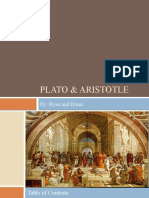Greek Philosophy: A Brief Description of Socrates, Plato, and Aristotle
Greek Philosophy: A Brief Description of Socrates, Plato, and Aristotle
Uploaded by
MissDangCopyright:
Available Formats
Greek Philosophy: A Brief Description of Socrates, Plato, and Aristotle
Greek Philosophy: A Brief Description of Socrates, Plato, and Aristotle
Uploaded by
MissDangOriginal Description:
Original Title
Copyright
Available Formats
Share this document
Did you find this document useful?
Is this content inappropriate?
Copyright:
Available Formats
Greek Philosophy: A Brief Description of Socrates, Plato, and Aristotle
Greek Philosophy: A Brief Description of Socrates, Plato, and Aristotle
Uploaded by
MissDangCopyright:
Available Formats
Greek Philosophy
Name Date Period
A Brief Description of Socrates, Plato, and Aristotle:
Ancient Greek philosophy is dominated by three very famous men: Socrates, Plato, and Aristotle. All three of these lived in Athens for most of their lives, and they knew each other. Socrates came first, and Plato was his student, around 400 BC. Socrates was killed in 399 BC, and Plato began his work by writing down what Socrates had taught, and then continued by writing down his own ideas and opening a school. Aristotle, who was younger, came to study at Plato's school, and ended up starting his own school as well. In the years after Plato and Aristotle died, in the 200's BC, three famous kinds of philosophy started up in the schools that Plato and Aristotle had started. These are the Stoics, the Skeptics, and the Epicureans. Each of these continued to be important ways of thinking about the world all the way through the Roman Empire, until people converted to Christianity in the 300's AD, and even after that. [When] Socrates was in his forties or so, he began to feel an urge to think about the world around him, and try to answer some difficult questions. He asked, "What is wisdom?" and "What is beauty?" and "What is the right thing to do?" He knew that these questions were hard to answer, and he thought it would be better to have a lot of people discuss the answers together, so that they might come up with more ideas. So he began to go around Athens asking people he met these questions, "What is wisdom?, "What is piety?", and so forth. Sometimes the people just said they were busy, but sometimes they would try to answer him. Then Socrates would try to teach them to think better by asking them more [questions, which] showed them the problems in their logic. Often this made people angry. Sometimes they even tried to beat him up. When Plato was a young man, he went to listen to Socrates, and learned a lot from Socrates about how to think, and what sort of questions to think about. When Socrates was killed in 399 BC, Plato was very upset (He was 30 years old when Socrates died) . Plato began to write down some of the conversations he had heard Socrates have. Practically everything we know about Socrates comes from what Plato wrote down. After a while, though, Plato began to write down his own ideas about philosophy instead of just writing down Socrates' ideas. One of his earlier works is the Republic, which describes what Plato thought would be a better form of government than the government of Athens. Plato thought that most people were pretty stupid, and so they should not be voting about what to do. Instead, the best people should be chosen to be the Guardians of the rest. (Remember Plato was from a rich aristocratic family so he probably considered himself among the best people!). Plato also thought a lot about the natural world and how it works. He thought that everything had a sort of ideal form, like the idea of a chair, and then an actual chair was a sort of poor imitation of the ideal chair that exists only in your mind.
When Aristotle was a young man, about 350 BC, he went to study at Plato's Academy. Plato was already pretty old then. Aristotle did very well at the Academy. But he never got to be among its leaders, and when Plato died, Aristotle was not chosen to lead the Academy after him. Soon afterwards, Aristotle left Athens and went to Macedon to be the tutor of the young prince Alexander, who grew up to be Alexander the Great. As far as we can tell, Alexander was not at all interested in learning anything from Aristotle, but they did become friends. When Alexander grew up and became king, Aristotle went back to Athens and opened his own school there, the Lyceum (lie-SAY-um), in competition with Plato's Academy. Both schools were successful for hundreds of years. Aristotle was more interested in science than Socrates or Plato, maybe because his father was a doctor. He wanted to use Socrates' logical methods to figure out how the real world worked; therefore Aristotle is really the father of today's scientific method. Aristotle was especially interested in biology, in classifying plants and animals in a way that would make sense. This is part of the Greek impulse to make order out of chaos: to take the chaotic natural world and impose a man-made order on it. When Alexander was [traveling] all over Western Asia, he had his messengers bring strange plants back to Aristotle for his studies. Aristotle also made efforts to create order in peoples' governments. He created a classification system of monarchies, oligarchies, tyrannies, democracies and republics, which we still use today.
The following passage is a selection of excerpts taken from http://www.historyforkids.org/learn/greeks/philosophy/index.htm
Use your knowledge of these Greek philosophers to answer the following questions and better understand the purpose of these philosophies. Please answer these questions in full sentences on a separate sheet of paper. 1. What would the impact have been if these philosophers did not established institutions that taught these philosophies? 2. How else do we use Socrates form of questioning in todays world? 3. Socrates never wrote down his own philosophies. Since Plato and Aristotle were the writers, could we just eliminate Socrates from the list of great Greek philosophers? Why or why not? 4. What if these philosophers were not asking questions about large, practical concepts in regards to society, politics, and daily life? How might that have changed the Greek empire?
The Socratic Method
In ancient Greece, Socrates wanted to learn about the world he lived in. He asked himself and people in his community about what was going on in society, daily life, politics, etc. He was so intelligent that he realized it would take a great discussion to answer these large questions, such as what is beauty? or what is wisdom? Socrates became famous for asking a series of question to help him come to conclusions. He believed that the answers to these questions were available, but it was the responsibility of the people to ask the right questions to get those answers. Asking a series of questions like this became known as the Socratic Method. For a very simple example, if Socrates lived todayand wanted to know why we wear shoes?, he might ask the following set of questions: 1. What do we use our feet for? (to walk) 2. Where do we walk? (in our homes, outside) 3. Where do we walk outside? (on the grass, on the sidewalk, on the pavement) 4. What happens when you walk outside barefoot? (sometimes, you scratch/cut/scrap/step in something dirty on the bottoms of your feet) 5. How can you stop from scratching your feet when you walk outside? (put something between your feet and the ground for protect) 6. How could you attach that protection to your foot? (straps, ties, etc.) 7. What are shoes? (a covering around your foot) 8. What does that covering do to help your foot? (protects your foot from getting scratched/cut/scrapped/or dirty) 9. Therefore, you wear shoes so you can walk outside and have your feet protected? (yes and the question is answered)
You might also like
- Important Mcqs of Pedagogy FPSCDocument23 pagesImportant Mcqs of Pedagogy FPSCsyed inam76% (17)
- Beyond Illusion and DoubtDocument194 pagesBeyond Illusion and DoubtSanket Shravane100% (2)
- Philosophies of EducationDocument156 pagesPhilosophies of Educationqulb abbas100% (3)
- The Big Three of Greek PhilosophyDocument3 pagesThe Big Three of Greek PhilosophyGenmar Morgia Frayna100% (1)
- 2.1 Economic Systems WorksheetDocument2 pages2.1 Economic Systems WorksheetMissDang80% (5)
- UNDERSTANDING THE SELF (Prelim Module)Document16 pagesUNDERSTANDING THE SELF (Prelim Module)Maniya Dianne Reyes91% (67)
- Book Scan CenterDocument75 pagesBook Scan CenterMateo Duque100% (1)
- Review The Art of Philosophy Wisdom As A PracticeDocument3 pagesReview The Art of Philosophy Wisdom As A PracticeMatiasBarrios86No ratings yet
- The Moral Argument - A History PDFDocument281 pagesThe Moral Argument - A History PDFaditya100% (4)
- 3 Great Greek PhilosophersDocument4 pages3 Great Greek PhilosophersJason LimNo ratings yet
- Comparison Between Socrates and Plato2 1Document6 pagesComparison Between Socrates and Plato2 1api-341333645No ratings yet
- Before You ReadDocument4 pagesBefore You ReadKali SampangNo ratings yet
- Greek PhilosophersDocument2 pagesGreek Philosophersapi-205540374No ratings yet
- SócratesDocument9 pagesSócratesFatima HernandezNo ratings yet
- Plato and AristotleDocument2 pagesPlato and AristotleTanya TandonNo ratings yet
- 01 Teaching Materials 2Document2 pages01 Teaching Materials 2Leonardo C. SilvestreNo ratings yet
- SocratesDocument5 pagesSocratesgagerNo ratings yet
- PLATODocument20 pagesPLATOShane Graciela100% (1)
- Socrates Research PaperDocument7 pagesSocrates Research Paperapi-462123330No ratings yet
- Name of The Philosopher: Socrates Origin:: Classical Greek Athenian PhilosopherDocument6 pagesName of The Philosopher: Socrates Origin:: Classical Greek Athenian PhilosopherPonnusamy ManivelNo ratings yet
- Greek Philosophers A ReviewDocument16 pagesGreek Philosophers A ReviewChristina ValenciaNo ratings yet
- Understanding SelfDocument6 pagesUnderstanding SelfWenie Malong ResosoNo ratings yet
- Plato & Aristotle: By: Ryan and ErinnDocument25 pagesPlato & Aristotle: By: Ryan and ErinnRyan RauschNo ratings yet
- Baetiong, Ayana Mae - Manuel. Khrystyn - Pahilagao, Dan - Palacio, Angela - Pascual, Raymond Socrates BiographyDocument17 pagesBaetiong, Ayana Mae - Manuel. Khrystyn - Pahilagao, Dan - Palacio, Angela - Pascual, Raymond Socrates BiographyRaymond A. PascualNo ratings yet
- Russo Socrates1Document4 pagesRusso Socrates1Henry Ft HersuNo ratings yet
- Written Report Grp1 Socsci Final. CNDocument9 pagesWritten Report Grp1 Socsci Final. CNJc LoremiaNo ratings yet
- Aristotle: Aristotle, Whose Name Means "The Best Purpose" in Ancient GreekDocument7 pagesAristotle: Aristotle, Whose Name Means "The Best Purpose" in Ancient Greekcedric castilloNo ratings yet
- The Life and Works of Plato and AristotleDocument23 pagesThe Life and Works of Plato and AristotleBelon Babes VillegasNo ratings yet
- Socrates (C. 469 - 399 B.C.) Was A Hugely Important Greek Philosopher From TheDocument5 pagesSocrates (C. 469 - 399 B.C.) Was A Hugely Important Greek Philosopher From TheAnna Marie SantosNo ratings yet
- ReportingDocument3 pagesReportingJake Cormanes PeraltaNo ratings yet
- Pre Socratic PeriodDocument20 pagesPre Socratic PeriodMohdNo ratings yet
- Sokrat - "I Know That I Know Nothing": 1. Dio Prezentacije - LifeDocument4 pagesSokrat - "I Know That I Know Nothing": 1. Dio Prezentacije - LifemalenapceNo ratings yet
- AristotleDocument9 pagesAristotleRaheelNo ratings yet
- (Aboguin, Brian E) Prelim PT1 - Edu C904Document2 pages(Aboguin, Brian E) Prelim PT1 - Edu C904Vinnie GognittiNo ratings yet
- Socrates: BiographyDocument32 pagesSocrates: BiographyAngeline LedeirreNo ratings yet
- Aristotle (384-322 BCE) : Ancient Greek Philosophy Ethics PlatoDocument16 pagesAristotle (384-322 BCE) : Ancient Greek Philosophy Ethics PlatoFarooq RahNo ratings yet
- SocratesDocument2 pagesSocratesÁlvaro Loyo MedieroNo ratings yet
- Philosophers ContributionDocument2 pagesPhilosophers ContributionAlex Satoshi EquiasNo ratings yet
- Lecture1 IntroductoryDocument15 pagesLecture1 IntroductoryMarielle Aria SantosNo ratings yet
- Plato HistoryDocument3 pagesPlato Historyazzwa bakhtiarNo ratings yet
- PlatoDocument27 pagesPlatoTalha GondalNo ratings yet
- Aristotle: Beginnings of Science and Philosophy in AthensDocument8 pagesAristotle: Beginnings of Science and Philosophy in AthensUmer MasoodNo ratings yet
- Compare and Contrast Jared VelezDocument7 pagesCompare and Contrast Jared Velezapi-285111688No ratings yet
- Bio OF SocratesDocument2 pagesBio OF SocratesGdisipuloNo ratings yet
- Ancient Greek ThinkersDocument3 pagesAncient Greek Thinkersapi-291662375No ratings yet
- SocratesDocument10 pagesSocratesMary Joy BernasolNo ratings yet
- Philosophy Plato Aristotle.01Document13 pagesPhilosophy Plato Aristotle.01anemonne27No ratings yet
- SocratesDocument1 pageSocratesSempilai TaipingNo ratings yet
- The Greek PhilosophersDocument31 pagesThe Greek Philosophersapi-234908816100% (1)
- I. The Life of Aristotle: PictureDocument30 pagesI. The Life of Aristotle: Picturemaria flora achayNo ratings yet
- Socrates EssayDocument4 pagesSocrates EssayKayley WestonNo ratings yet
- Aristotle Ethics FinalDocument7 pagesAristotle Ethics FinalKirsten AgbayaniNo ratings yet
- Lecture1 IntroductoryDocument15 pagesLecture1 IntroductoryMary Ann PateñoNo ratings yet
- Plato - An Ancient Philosopher-1 PDFDocument21 pagesPlato - An Ancient Philosopher-1 PDFAli ZohaibNo ratings yet
- Historical Background On Plato's Apology of SocratesDocument6 pagesHistorical Background On Plato's Apology of SocratesdlgirNo ratings yet
- Filsafat Masa Socrates: Sejarah Dan Diskursus Pemikiran: AbstrakDocument6 pagesFilsafat Masa Socrates: Sejarah Dan Diskursus Pemikiran: AbstrakSarahNo ratings yet
- Greek Philosophy PhilosophyDocument8 pagesGreek Philosophy PhilosophyJaffar ZubairNo ratings yet
- Greece - Sophists & SocratesDocument31 pagesGreece - Sophists & SocratesElRulosNo ratings yet
- Political Philosophy The Greek PhilosophersDocument10 pagesPolitical Philosophy The Greek PhilosophersLatif ubed narejoNo ratings yet
- Unit 2Document14 pagesUnit 2Wajahat socratesNo ratings yet
- 6.2 Nobel Prize ActivityDocument5 pages6.2 Nobel Prize ActivityMissDangNo ratings yet
- Chapter 7 Market StructureDocument14 pagesChapter 7 Market StructureMissDang100% (1)
- 5.1 Dawn of Industrial RevolutionDocument28 pages5.1 Dawn of Industrial RevolutionMissDangNo ratings yet
- 5.4 New Ways of ThinkingDocument12 pages5.4 New Ways of ThinkingMissDangNo ratings yet
- 5.3 Social Impacts of The Industrial RevolutionDocument36 pages5.3 Social Impacts of The Industrial RevolutionMissDang100% (2)
- 6.1 The Industrial Revolution SpreadsDocument15 pages6.1 The Industrial Revolution SpreadsMissDangNo ratings yet
- 6.4 Arts in The Industrial AgeDocument43 pages6.4 Arts in The Industrial AgeMissDangNo ratings yet
- Ch. 4 - Europe & Latin America RevolutionDocument9 pagesCh. 4 - Europe & Latin America RevolutionMissDangNo ratings yet
- Ch. 4 Bolivar Close ReadingDocument2 pagesCh. 4 Bolivar Close ReadingMissDangNo ratings yet
- 5.2 Theory of ProductionDocument10 pages5.2 Theory of ProductionMissDangNo ratings yet
- Chapter 6 Prices and Decision MakingDocument11 pagesChapter 6 Prices and Decision MakingMissDangNo ratings yet
- 1st Quarter Notebook Check Rubric 2013Document2 pages1st Quarter Notebook Check Rubric 2013MissDangNo ratings yet
- 2.2 Evaluating Economic PerformanceDocument12 pages2.2 Evaluating Economic PerformanceMissDangNo ratings yet
- Ch. 4 Map WorksheetDocument2 pagesCh. 4 Map WorksheetMissDangNo ratings yet
- 5.3 Cost, Revenue and Profit Maximization WKSTDocument2 pages5.3 Cost, Revenue and Profit Maximization WKSTMissDang100% (1)
- 4.3 Elasticity of DemandDocument12 pages4.3 Elasticity of DemandMissDangNo ratings yet
- 5.1 What Is SupplyDocument18 pages5.1 What Is SupplyMissDangNo ratings yet
- 2.1 Philosophy in The Age of ReasonDocument33 pages2.1 Philosophy in The Age of ReasonMissDangNo ratings yet
- 2.3 Birth of The American RepublicDocument14 pages2.3 Birth of The American RepublicMissDangNo ratings yet
- 2.2 Enlightenment Ideas SpreadDocument34 pages2.2 Enlightenment Ideas SpreadMissDangNo ratings yet
- 3.4 Age of NapoleonDocument12 pages3.4 Age of NapoleonMissDangNo ratings yet
- 3.2 French Revolution UnfoldsDocument19 pages3.2 French Revolution UnfoldsMissDangNo ratings yet
- 1.5 Democratic Development in EnglandDocument36 pages1.5 Democratic Development in EnglandMissDangNo ratings yet
- 1.3 Economic Choices and Decision MakingDocument10 pages1.3 Economic Choices and Decision MakingMissDangNo ratings yet
- 1.2 Basic Economic ConceptsDocument22 pages1.2 Basic Economic ConceptsMissDangNo ratings yet
- 1.1 Scarcity and The Science of EconomicsDocument20 pages1.1 Scarcity and The Science of EconomicsMissDangNo ratings yet
- 1.4 Rise of ChristianityDocument13 pages1.4 Rise of ChristianityMissDangNo ratings yet
- 1.2 The Roman Republic and EmpireDocument18 pages1.2 The Roman Republic and EmpireMissDangNo ratings yet
- Quiz (8609) - by MR HamidDocument26 pagesQuiz (8609) - by MR Hamidtoonsfreak14No ratings yet
- March 8Document9 pagesMarch 8ssblanchardNo ratings yet
- Philosophy Lesson 1Document5 pagesPhilosophy Lesson 1Kaila EskakNo ratings yet
- JurisprudenceDocument444 pagesJurisprudenceSana100% (2)
- IDENTIFICATION: Supply The Correct Answer That Corresponds To The Given ItemsDocument3 pagesIDENTIFICATION: Supply The Correct Answer That Corresponds To The Given Itemsprecious2lojaNo ratings yet
- The Elements of Moral Philosophy: PrefaceDocument4 pagesThe Elements of Moral Philosophy: PrefaceLeysha SorensonNo ratings yet
- Tejera, Platos Dialogues One by OneDocument955 pagesTejera, Platos Dialogues One by Onemartinforciniti100% (1)
- Joseph Waligore - Indian Influence On GreeksDocument10 pagesJoseph Waligore - Indian Influence On GreeksJulia BlackwolfNo ratings yet
- The Three Parts of The SoulDocument4 pagesThe Three Parts of The SoulJon David RodriguezNo ratings yet
- The Self From Various Philosophical Perspective - PSYCH 101Document3 pagesThe Self From Various Philosophical Perspective - PSYCH 101Gerin BuenoNo ratings yet
- Plato - Uts Ab-Comm1a - Chris Ardinazo - Joshua AlbaniaDocument13 pagesPlato - Uts Ab-Comm1a - Chris Ardinazo - Joshua AlbaniaDiyes StudiosNo ratings yet
- ETHICS03Document8 pagesETHICS03Robert CatapanoNo ratings yet
- Socratic Pedgagogy 2012Document12 pagesSocratic Pedgagogy 2012Gladys LimNo ratings yet
- Prapti AgrawalDocument14 pagesPrapti AgrawalHarshit AgarwalNo ratings yet
- Greece - Sophists & SocratesDocument31 pagesGreece - Sophists & SocratesElRulosNo ratings yet
- Understanding The Self PDFDocument71 pagesUnderstanding The Self PDFMia Joylyn LucianoNo ratings yet
- UTS Lesson 1Document26 pagesUTS Lesson 1THE FAILY BROTHERSNo ratings yet
- 5th. The Contribution of Greek, Persians and RomansDocument26 pages5th. The Contribution of Greek, Persians and RomansJohn Jerome GironellaNo ratings yet
- Nietzsche and PlatoDocument29 pagesNietzsche and PlatoNikola TatalovićNo ratings yet
- 01 Handout 1 (26) UnderDocument5 pages01 Handout 1 (26) UnderChloe Jane OradaNo ratings yet
- 1 Preliminary Examination in Philosophy 101: Select The Correct Answer From These Choices. Answers May Be RepeatedDocument2 pages1 Preliminary Examination in Philosophy 101: Select The Correct Answer From These Choices. Answers May Be RepeatedMira VeranoNo ratings yet
- Literary Style and Common Sense in Berkeley's Three Dialogues Between Hylas and PhilonousDocument84 pagesLiterary Style and Common Sense in Berkeley's Three Dialogues Between Hylas and PhilonousCamille Philippon100% (1)
- Seminar 9 LacanDocument25 pagesSeminar 9 Lacanamitbengal1No ratings yet





















































































































